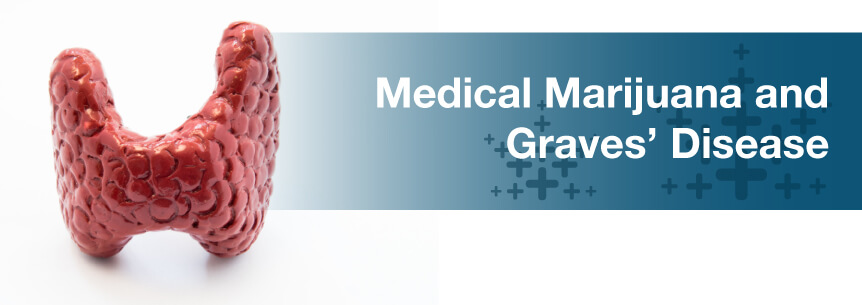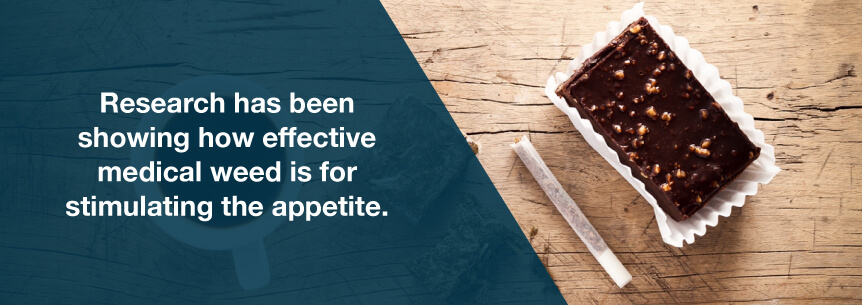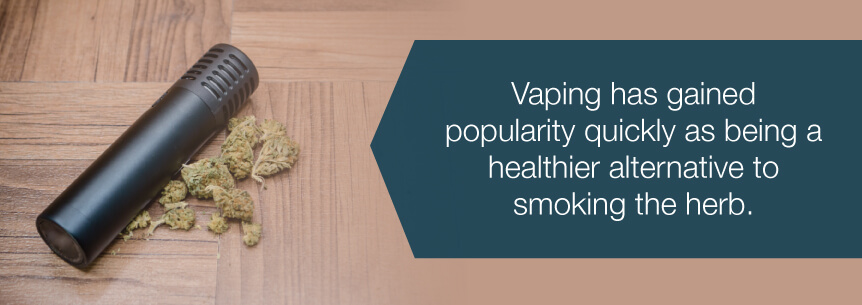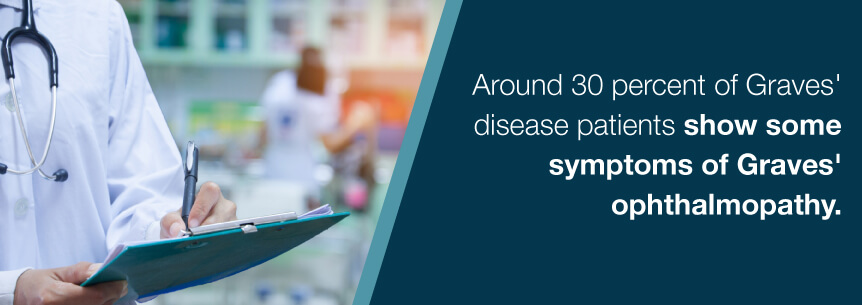
Medical cannabis is a medicinal herb used for thousands of years to help individuals treat a wide range of ailments. In fact, it even dates back to the Stone Age, more than 10,000 years ago. Historically, individuals used the herb for pain, cramping, mental issues, insomnia, inflammation and more. These days, since the medical community has been taking an interest, medical marijuana for Graves’ disease is now another thing to add to the growing list.

Research has been showing how effective medical weed is for stimulating the appetite. Medical cannabis for Graves’ disease may help relieve pain from your Graves’ condition. Standard therapies often result in joint pain and other painful side effects.

Find A Doctor Find A Dispensary
Studies also show marijuana for Graves’ disease treatment decreases pain levels substantially. As an additional benefit, pot could reduce a patient’s opiate-based painkiller dependence. When their dependency is reduced, patients are at a less risk of addiction or overdose.
Additionally, there are no serious side effects of medical cannabis, as there are with opiates and other Graves’ disease medications. Because of this, cannabis and Graves’ disease treatment may be a good option for people suffering from this condition.
Even though more research is necessary to determine the exact impact medical marijuana has on levels of thyroid hormone, many studies indicate weed could benefit patients with an autoimmune condition. A Th17 phenotype characterizes conditions like Graves’ disease, and this could decrease by THC’s psychoactive effects being reduced by nonpsychoactive CBD. The study also demonstrates cannabidiol has increased anti-inflammatory cytokine IL-10.
Cannabinoids downregulate chemokine and cytokine production, sometimes even regulatory T cells. When proinflammatory cytokines decrease and T cells regularly increase, it may help suppress the autoimmune element.
Cannabis and Graves’ disease treatment may help fight certain Graves’ disease symptoms, though not the disease itself. Symptoms medical pot can help with include:
Medical cannabis also helps improve quality of life.
The best marijuana and Graves’ disease strains are Sativa for use during the day and Indica strains for using later on in the afternoon or at night. You can also try a hybrid, which is a combination of both.
These strains below can help you relieve all the symptoms listed above.
Strains for Fatigue
Strains for Nausea and Vomiting
Strains for Eye Pressure
Strains for Weight Loss
Strains for Anxiety and Depression
Patients may become overwhelmed with the various methods of using their medical marijuana if they’re new to this treatment. However, the availability of the different methods of delivering their treatment sets weed apart from standard treatments. Patients can use each method to achieve the desired effect.
CB1 and CB2 play a vital part in any method of action. Cannabis treatment can help with some health conditions, including:
Smoking is the most popular and traditional method for administering medical marijuana treatment because it provides the most immediate effect out of all methods. For instance, it can provide quick relief from pain and nausea. However, smoking can cause lung irritation, so people with asthma, COPD, emphysema or other lung problems should avoid this method.
Vaping has gained popularity quickly as being a healthier alternative to smoking the herb. Vaping doesn’t produce the harmful smoke, since there are fewer byproducts because of the lower temperature vapes use.

This method could be a little tricky, since it’s hard to know the exact dose. It produces longer-lasting effects, but could take a couple of hours before you feel them. Edibles come in the forms of brownies, cookies, chews and more. Since the effects of edibles take longer to feel, it’s possible for you to over-consume and take a higher dosage than you wanted or expected to.
Tinctures and oils are marijuana concentrates you can add to food, drink or other products, or consume by themselves. You can even get some cannabis oils in pill form. Most often, tinctures are in the form of a product you spray or squirt into your mouth, where it enters your bloodstream.
This method of pot consumption is less popular, but is still good for people suffering from pain and inflammation. Topical marijuana products usually don’t have any psychoactive properties, making them a suitable method if you’re a first-time user. Topical solutions include salves, sprays, ointments and lotions that can provide localized pain relief.
Other methods of consuming medical marijuana include ingesting fresh cannabis, dabbing, drinking weed-infused beverages and using suppositories. You can work with your marijuana doctor or budtender to discuss which method of taking cannabis is right for you.
If you have any questions about medical marijuana and Graves’ disease, you can discuss them with a medical marijuana doctor to get them answered. Cannabis doctors are well-educated on medical marijuana, unlike other primary doctors who might not be able to answer your questions.
To buy medical cannabis for Graves’ disease to help treat your symptoms, you will need to get a medical marijuana card and recommendation from a licensed cannabis doctor. Search for a medical marijuana dispensary or find a cannabis doctor all in one place online.
Graves’ disease causes your body’s thyroid gland to create an excess of thyroid hormone, referred to as hyperthyroidism. Graves’ disease is a common type of hyperthyroidism and is an autoimmune disorder.
With this condition, your immune system creates thyroid-stimulating immunoglobulin antibodies which attach themselves to your healthy thyroid cells. They may lead this gland in your neck to produce too much thyroid hormone — the hormone affecting various facets of your body, including your brain development, nervous system function, body temperature and others.
Hyperthyroidism, when not treated, could cause:
Since your thyroid hormones can affect various systems in your body, Graves’ disease symptoms may vary widely and influence your general well-being significantly.
Your chances of developing this condition increase due to factors such as family history. If you have an autoimmune condition, it can also increase your risk of developing the disorder. Some conditions increase the risk of developing Graves’ disease include:
In the late 19th century, newspapers referred to Graves’ disease as “exophthalmic goiter,” since to receive a diagnosis, you had to have bulging eyes. In 1879, The Daily Times in Chester, Penn., reported a Dr. Pepper giving 70 patients a discussion about his work. When there was no death involved, patients with Graves’ disease hardly ever received any personal attention.
Some symptoms of Graves’ disease include:
Around 30 percent of Graves’ disease patients show some symptoms of Graves’ ophthalmopathy. Here, immune system events, like inflammation, affect your tissues and muscles around your eyes leading to symptoms like:

Complications or physical effects of Graves’ disease can include:
When you have untreated Graves’ disease, it can result in changes in the function and structure of your heart muscles, heart rhythm disorders and congestive heart failure, or your heart being unable to pump enough blood to your body.
Graves’ disease patients who are pregnant may have potential complications like:
Untreated hyperthyroidism can lead to osteoporosis, a condition that leads to brittle, weak bones. How strong your bones are depends mostly on how much minerals and calcium they contain. If you have too much thyroid hormone, it can interfere in how your body absorbs calcium in your bones.
An uncommon — yet life-threatening — complication of Graves’ disease is thyroid storm, also called thyrotoxic crisis or accelerated hyperthyroidism. Thyroid storm is more probable if you have severe untreated or inadequately treated hyperthyroidism.
The dramatic and sudden thyroid hormone increase may produce a variety of effects, including:
With thyroid storm, you must seek immediate medical attention.
Graves’ disease links to an increase in psychiatric morbidity, according to a study of 157 Graves’ disease patients. The study included 251 control patients with nodular goiters — 140 treated and 17 newly diagnosed — who all completed the Hospital Anxiety and Depression Scale.
Anxiety and depression levels in Graves’ disease were substantially higher than in controls. There was a 10 percent depression prevalence in Graves’ disease, compared to the 4 percent in nodular goiters. Anxiety in Graves’ disease was 18 percent, compared to 13 percent for nodular goiters. There was an increase in both depression and anxiety with comorbidity.
Statistics show:
When you receive the right treatment, you can reduce Graves’ disease’s effects. The treatment objective is to control hyperthyroidism over-production. You have three main options of treatment for this condition. Your endocrinologist or doctor will suggest the treatment they feel is best for you and your specific case.
The three main treatment options include:
These medications keep your thyroid from making hormones. Propylthiouracil and Methimazole are generic drugs that can hinder your thyroid gland’s ability to produce hormones. Although these medications relieve symptoms effectively, hyperthyroidism can come back once you stop the medication.
Potential side effects of these medications may include:
Some physicians favor RAI treatment, since antithyroid medications don’t always offer hyperthyroidism patients a long-term solution, and surgery can have serious complications. You take RAI in a water-based solution or capsule. It could take several months before this treatment starts producing results, and in some cases, you may require repeated doses.
RAI destroys thyroid tissue cells and reduces your levels of thyroid hormone. However, there’s debate on whether an individual dose or fixed dose is best. The RAI treatment objective is to ensure there’s enough thyroid tissue for the development of a healthy hormone balance.
Though it may sound strange, one common side effect of RAI is hypothyroidism. Some other side effects may include:
The manner in which patients use RAI won’t impair fertility or cause thyroid cancer.
There are a variety of reasons you would require surgery. For instance, if you can’t tolerate or take RAI or antithyroid medication or if they’re not successful, your doctor may suggest surgery. Another reason is if you’re pregnant and the antithyroid medication isn’t working. In some situations, a goiter could require surgical removal.
Some potential complications post-surgery may include: